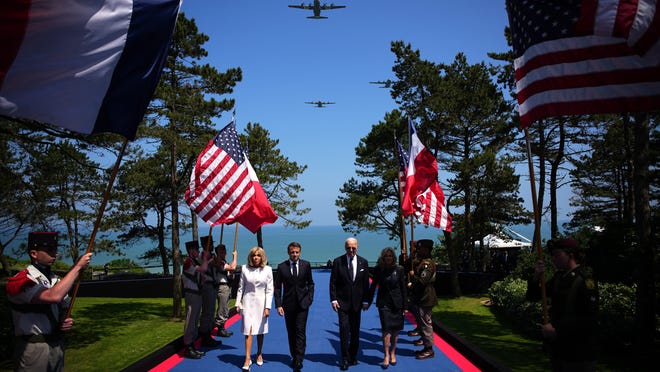“A slap in the face”, “madness”, “now what should we do?” – these were some of the headlines in French newspapers on Monday after President Emmanuel Macron’s gamble ended in deadlock and a leadership crisis.
Macron’s gamble was to call early parliamentary elections to curb the rise of right-wing political forces in the country.
But the vote surprisingly dealt a blow to Marine Le Pen’s anti-immigration, eurosceptic National Rally, which dropped to an unexpected third place in official tallies behind Macron’s centrist Ensemble coalition. The New Popular Front, a left-wing coalition of parties headed by Jean-Luc Mélenchon, won the most seats in France’s 577-seat National Assembly, contrary to the predictions of opinion polls and political experts.
Macron’s position safe, parliament in limbo
Macron’s position is secure. That’s never been in doubt. His term runs until 2027. France divides political executive functions between a president and a prime minister, with defence and security the prerogative of the president and the prime minister typically concerned with the country’s domestic affairs, from education to immigration.
Prepare to vote: See who’s running for president and compare their positions on key issues with our Voter Guide
But Sunday’s election results left no party or coalition with an absolute majority in the National Assembly, leaving France with a divided legislature known as a “hung” parliament, making it difficult for any party to achieve its policy plan. French politics has been thrown into days, weeks or even months of paralysis as factions try to cobble together a power coalition.
The left has won in France, but is France a left-leaning country?
Left-wing parties won the most seats in parliament. But it is not clear that France as a whole is a politically left-wing country. Many of these seats were won only as a result of so-called strategic voting by parties opposed to the right-wing policies of the National Rally: protectionist on trade and the economy, populist on reducing immigration, and eager to restore the “prestige” that they see as France’s loss on the world stage.
The vote took place just 18 days before the Paris Olympics began.
Macron called the elections after his party’s dismal showing in June’s European Union elections, where his National Rally party won a majority of seats. Sunday’s elections were largely to determine the political colour of the French parliament. Pre-vote surveys had predicted that Le Pen’s National Rally party would win and form a government. In this context, voters would choose who would be prime minister, as well as a cabinet that would work with Macron but not be bound by centrist policies.
The country’s politics are now, to use a worn-out phrase, entering uncharted territory.
France’s current prime minister, Gabriel Attal of Macron’s liberal-center party, has already announced his intention to resign. As such, he is unlikely to become prime minister or remain in office for long. Macron on Monday asked Attal to stay on as prime minister “for the time being” in the interest of “national stability.” Le Pen’s far-right party failed to win enough seats to appoint Jordan Bardella, a charismatic and TV-friendly 28-year-old Le Pen protege who was seen as the next prime minister before the vote. The New Popular Front’s Mélenchon has already claimed the prime ministerial position, saying late Sunday that “the president must ask the New Popular Front to govern.”
But Mr. Melenchon’s critics say he is a far-left firebrand who has come close to taking power in France before, rattling financial markets each time. He disagrees with Mr. Macron on almost every point. He wants to lower France’s retirement age, not raise it. Mr. Melenchon wants to dramatically increase government spending on social welfare, environmental protection and health care. Mr. Macron, a former banker, is a pro-business reformer. French stocks fell on Monday after it became clear that no party had a clear governing majority.
“When it comes to the economy, La France Inthomise (Mr. Melenchon’s party) is really extreme,” said Jean-Yves Camus, a political scientist at the Paris-based French Institute for International and Strategic Studies.
“France is too soft on law and order and on immigration. Its pro-Hamas, pro-Islamic foreign policy is also problematic, causing fear among the 500,000 Jews living in France,” Camus said.
On Sunday night, left-wing supporters lit up a celebratory firework display at the Place de la Republique’s “Marianne” statue, a national symbol of France that represents reason, liberty and the ideals of the Republic.
Mr Macron has yet to speak publicly about the election results, and Marine Tondriere, a Green lawmaker from Mr Mélenchon’s New Popular Front coalition, said that needed to change.
“Institutional logic says that Macron should ask the New Popular Front to nominate him as prime minister. Will he do it? Or not? This president is always full of surprises, so let’s wait and see,” she said.
Still, Le Pen, who is almost certain to be the National Rally’s presidential candidate when Macron’s term ends in 2027, said Sunday that all is not lost. Her party had won seats and sowed the seeds for the future, she said.
“Our victory is simply delayed,” she said.


